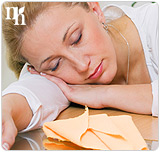When women reach menopause, they usually experience a number of menopausal signs and symptoms, caused by hormone imbalance. Hormone imbalance happens when the body begins to produce fewer estrogen and progesterone hormones, as the ovaries slowly stop their monthly release of an egg in preparation for pregnancy. As hormone levels decline, they fall out of balance. It is not only hormone imbalance that directly causes fatigue. Crashing fatigue can also be caused by other menopausal symptoms such as night sweats, which can disturb sleep and leave women fatigued.
What Is Crashing Fatigue?

Fatigue is the sensation of extreme tiredness and exhaustion. The majority of people do not suffer from fatigue unless it is late at night, they have had a long, tiring day, or their sleep was disturbed the night before. However, some menopausal woman will find that they feel crashing fatigue for no apparent reason. This is called hormone imbalance fatigue. Hormone imbalance fatigue can cause menopausal women to feel tired in the middle of the day or even after a long sleep.
What Is Hormone Imbalance Fatigue?
A hormone imbalance can affect women in many different ways. Vaginal dryness, anxiety, and night sweats are just three of the symptoms of hormone imbalance during menopause that can leave women fatigued and struggling to cope. For example, when menopausal women suffer from night sweats, they will experience disturbed sleep and they may be left extremely fatigued. However, this type of fatigue has an explanation.
For other women, their fatigue is less easily explained; they may sleep solidly through the night only to be exhausted half way through the next day. This kind of hormone imbalance fatigue occurs when there is a drop in estrogen and progesterone that the body is struggling to cope with.
What Can Be Done to Cope with Crashing Fatigue?
Hormone imbalance fatigue should be first tackled with healthy lifestyle changes.

- Exercise is one of the biggest energy boosters. Exercising five times a week, for half an hour a day, can help to balance hormone levels and prevent episodes of fatigue.
- A healthy diet is essential to combat fatigue. Food is the fuel of the body and women cannot function properly without being well nourished.
- Sleeping for the recommended 7 to 8 hours a night is extremely important for beating fatigue.
Another way to combat fatigue is to get straight to the root of the hormonal cause, by tackling the hormone imbalance. There are a range of treatment options available, but natural supplements are an excellent way to complement these healthy lifestyle changes.
However, if menopausal women suffer from extreme fatigue, they should visit their medical practitioners. Hormone imbalance fatigue can be serious when it begins to affect a woman's daily life. If extreme fatigue leaves a woman unable to continue with her normal activities, it may be indicative of a bigger problem. Click here for more information about treating hormone imbalance fatigue and other menopause signs and symptoms.